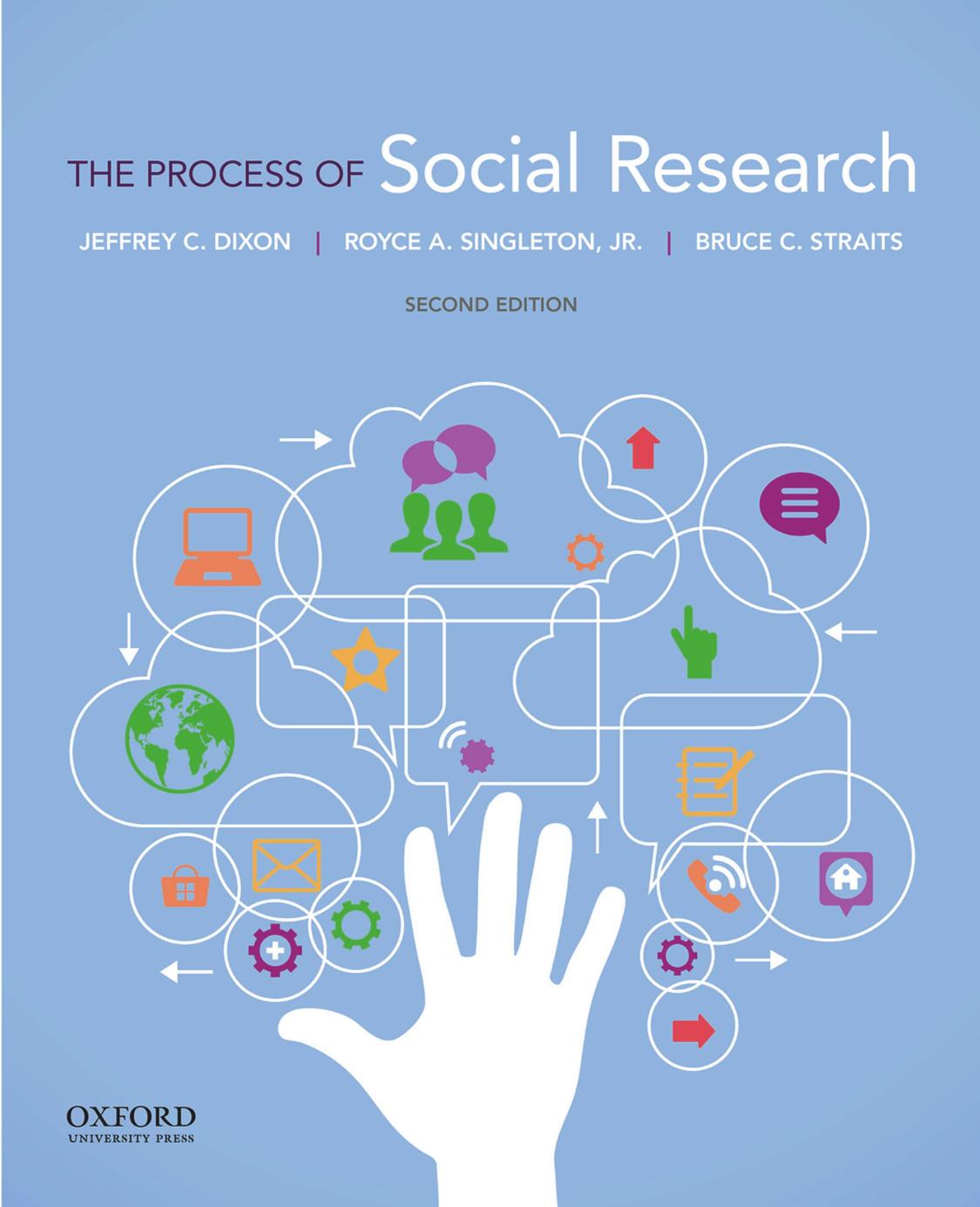Process of Social Research 3rd Edition Jeffrey Dixon, Royce Singleton, Bruce Straits 0197613756 9780197613757
$70.00 Original price was: $70.00.$50.00Current price is: $50.00.
Instant download Process of Social Research 2nd Edition By Jeffrey The Jeffrey C. Dixon Royce A. Singleton Jr. & Bruce C. Straits after payment
Process of Social Research 3rd Edition By Jeffrey C. Dixon, Royce A. Singleton, Bruce C. Straits – Ebook PDF Instand Download/DeliveryISBN: 0197613756, 9780197613757
Full dowload Process of Social Research 3rd Edition after payment

Product details:
ISBN-10 : 0197613756
ISBN-13 : 9780197613757
Author: Jeffrey C. Dixon, Royce A. Singleton, Bruce C. Straits
Featuring a conversational, engaging, and student-friendly writing style, The Process of Social Research, Third Edition, introduces students to the fundamentals of research. It places a unique emphasis on process with flowcharts in every chapter that provide step-by-step guides for conducting social research and evaluating the research of others. The authors use relatable, everyday examples and carefully selected research examples to make the book accessible to undergraduates. Comprehensive and up-to-date without attempting to be encyclopedic in its coverage, The Process of Social Research provides a balance between qualitative and quantitative research, taking a more integrated approach to describing the relationship between theory and research.
Process of Social Research 3rd Table of contents:
1 Introduction
The Process of Social Research
Four Social Media Studies
An Experiment
A Survey
A Field Research Study
An Analysis of Existing Data
Summary
Key Points
Review Questions
Exercises
List of Key Terms
2 Science and Social Research
The Characteristics and Process of Science
Theory
Verifiable Data
Systematic Observation and Analysis
Logical Reasoning
Summary
Logics of Inquiry
Does Contact Change Stereotypes? An Answer From Deductive Inquiry
How Does Class Matter? An Answer From Inductive Inquiry
Combining the Logics of Inquiry
From a Psychological Theory of Suicide to a Sociological One
Summary
Evaluating Science: Possibilities, Cautions, and Limits
Tentative Knowledge
The Ideal and Reality of the Scientific Process
The Sociohistorical Aspect of Science
The Human Element of Science
Summary
Key Points
Review Questions
Exercises
List of Key Terms
3 The Ethics and Politics of Research
Overview: Ethics
Ethical Issues in the Treatment of Research Participants
Potential Harm
Informed Consent
Deception
Invasion of Privacy
Summary
Federal and Professional Ethical Guidelines
Evaluating Potential Harm
Informed Consent Procedures
Deception Ground Rules
Privacy Protection: Anonymity and Confidentiality
Summary
The Process of Ethical Decision-Making
Review Federal Regulations and Professional Ethics Codes
Assess Costs and Benefits of Proposed Research
Identify and Address Areas of Ethical Concern
Prepare and Submit Application for IRB Approval
Collect Data and Secure Participants’ Rights
Summary
Politics and Social Research
Topic Selection, Political Ideology, and Research Funding
Data Analysis and Interpretation and Political Ideology
Dissemination of Research Findings: Science, Politics, and Public Policy
Summary
The Intersection of Ethics and Politics in Social Research
A Case Study: Research on Same-Sex Parenting
Conflict of Interest
Social Responsibility
Summary
Key Points
Review Questions
Exercises
List of Key Terms
4 Research Designs
Initial Steps in the Research Process
Select Research Topic
Review the Literature/Consider Theory
Formulate Research Question
Prepare Research Design
Summary
Designing Research to Answer Quantitative Questions
Select a Research Strategy
Identify and Select Units of Analysis
Measure Variables
What is a Variable?
Types of Variables
Gather Data and Analyze the Relationships Among Variables
Association
Direction of Influence
Nonspuriousness (No Common Cause)
Causation, Intervening Variables, and Theory
Summary
Designing Research to Answer Qualitative Questions
Select Research Strategy
Select Field Setting, Social Group, and/or Archival Records
Gain Access and Establish Relationships
Decide Whom to Observe or Interview or What to Read
Gather and Analyze Data
Summary
Key Points
Review Questions
Exercises
List of Key Terms
5 Measurement
Overview: The Measurement Process
Conceptualization and Operationalization
Conceptualization
Operationalization
Specify Empirical Indicators
Spell Out Procedures
Summary
Variations in Operational Definitions: Data Sources
Manipulated Versus Measured Operations
Sources of Measured Operational Definitions
Verbal Reports
Observation
Archival Records
Summary
Variation in Operational Definitions: Levels of Measurement
Nominal Measurement
Ordinal Measurement
Interval Measurement
Ratio Measurement
Summary
Select and Apply Operational Definitions to Produce Data
Summary
Assess the Quality of Operational Definitions
Forms of Reliability Assessment
Test-Retest Reliability
Internal Consistency
Inter-Rater Reliability
Improving Reliability
Forms of Validity Assessment
Convergent Validation
Construct Validation
Summary
The Feedback Loop: From Data Back to Concepts and Measurement
Summary
Key Points
Review Questions
Exercises
List of Key Terms
6 Sampling
Overview: The Sampling Process
Principles of Probability Sampling
Probability and Random Selection
Probability Distribution and Sampling Error
Sampling Distributions
Statistical Inference
Summary
Steps in Probability Sampling
Define Target Population
Construct Sampling Frame
Devise Sampling Design
Simple Random Sampling
Stratified Random Sampling
Cluster Sampling
Determine Sample Size
Desired Precision
Available Resources
Draw Sample
Summary
Nonprobability Sampling
Overview of Nonprobability Sampling
Steps in Nonprobability Sampling
Select Cases or Research Sites
Select Observations
Convenience Sampling
Purposive Sampling
Snowball Sampling
Theoretical Sampling
Making Inferences From Nonprobability Samples
Summary
Key Points
Review Questions
Exercises
List of Key Terms
7 Experiments
Introductory Example: Misconduct in Criminal Prosecution
The Logic of Experimentation
Summary
Variations on the Experimental Method
Variations in Experimental Design
Timing and Measurement of the Dependent Variable
Number of Independent Variables Manipulated
Variations in Experimental Context
Field Experiments
Survey-Based Experiments
Summary
The Process of Conducting Experiments
Pretesting
Participant Recruitment and Informed Consent
Introduction to the Experiment
Experimental Manipulation and Random Assignment
Manipulation Checks
Measurement of the Dependent Variable
Debriefing
Summary
Strengths and Weaknesses of Experiments
Internal Validity
External Validity
Reactive Measurement Effects
Content Restrictions
Summary
Key Points
Review Questions
Exercises
List of Key Terms
8 Surveys
Introductory Example: The Constructing the Family Survey
General Features of Survey Research
Large-Scale Probability Sampling
Structured Interviews or Questionnaires
Quantitative Data Analysis
Summary
Variations in Survey Designs and Modes
Survey Research Designs
Cross-Sectional Designs
Longitudinal Designs
Data-Collection Modes
Face-To-Face Interviews
Telephone Interviews
Paper-and-Pencil Questionnaire
Computer-Assisted Self-Interviews
Mixed-Mode Surveys
Summary
The Process of Planning and Conducting a Survey
Choose Mode of Data Collection
Construct and Pretest Questionnaire
Organizing the Questions
Pretesting
Choose Sampling Frame/Design and Select Sample
Recruit Sample and Collect Data
Code and Edit Data
Summary
Strengths and Weaknesses of Surveys
Generalization to Populations
Versatility
Efficiency
Establishing Causal Relationships
Measurement Issues
Summary
Key Points
Review Questions
Exercises
List of Key Terms
9 Field Research and In-Depth Interviews
Introductory Field Research Example: Mexican New York
Introductory In-Depth Interview Example: Mexican Americans Across Generations
General Features of Qualitative Research
Observation
Interviews
Supplementary Archival and Other Data
Nonprobability Sampling
Qualitative Data Analysis
Reflexivity
Summary
Variations in Qualitative Research Methods
Degrees of Participation and Observation
Participant Observation
Nonparticipant Observation
Between Participation and Observation
Overt Versus Covert Observation
Overt Observation
Covert Observation
Between Overt and Covert Observation
Interview Structure
Individual Versus Group Interviews
Technological Developments Crosscutting Observation and Interviews
Summary
The Process of Conducting Field Research
Select Setting/Group
Gain Access
Personal Characteristics
Nature of the Setting
Gatekeepers and Other Permissions
Establish Roles and Relationships
Decide What to Observe/Whom to Interview
Gather and Analyze Data
Leave the Field
Write the Report
Summary
The Process of Conducting In-Depth Interviews
Select and Recruit Interviewees
Develop Interview Guide
Gather Data
Analyze Data
Summary
Strengths and Limitations of Qualitative Research
Naturalistic Approach
Subjective and Contextual Understanding
Flexible Research Design
Generalizability
Reliability and Validity
Efficiency
Summary
Key Points
Review Questions
Exercises
List of Key Terms
10 Existing Data Analysis
Sources and Examples of Existing Data
Public Documents and Official Records
Private Documents
Mass Media
Physical, Nonverbal Evidence
Social Science Data Archives
Summary
Analysis of Existing Statistical Data
Existing Statistics Example: The Impact of MTV’s 16 and Pregnant on Teen Childbearing
The Process of Analyzing Existing Statistics
Search for and Obtain Data
Measure Variables
Evaluate and Adjust Data
Analyze Data
Summary
Content Analysis
Content Analysis Example: Journalistic Accounts of the Iraq War
The Process of Content Analysis
Select Recorded Communication
Define Unit of Analysis
Develop Coding Scheme
Sample Units
Train Coders and Pilot-Test Reliability
Code Variables and Carry Out Analysis
Summary
Comparative Historical Analysis
An Example of Comparative Historical Analysis: The Emergence of Mass Imprisonment
The Process of Comparative Historical Analysis
Specify Analytic Framework
Select Cases and Compile Case Studies
Conduct Within-Case Analyses
Conduct Cross-Case Analysis/Develop Causal Explanation/Apply to Case Studies
Summary
Strengths and Limitations of Existing Data Analysis
Studying Social Structure, History, and Social Change
Nonreactive Measurement
Cost-Efficiency
Data Limitations
Summary
Key Points
Review Questions
Exercises
List of Key Terms
11 Multiple Methods
A Comparison of Four Basic Approaches to Social Research
Summary
Examples of Mixed Methods Research
Effect of Abuse on Marriage and Cohabitation
What Employers Say Versus What They Do
Explaining Discrimination in a Low-Wage Labor Market
Unpredictability and Unequal Control of Work Schedules and Time
Purposes of Mixed Methods Research
Triangulation
Complementarity
Development
Expansion
Summary
Mixed Methods Research Designs
Sequential Designs
Concurrent Designs
Component Designs
Integrated Designs
Summary
Key Points
Review Questions
Exercises
List of Key Terms
12 Quantitative Data Analysis
Introductory Example of Survey Data Analysis: Drinking and Grades
Introductory Overview: The Process of Quantitative Analysis
Prepare Data for Computerized Analysis: Data Processing
Coding
Editing
Entering the Data
Cleaning
Summary
Inspect and Modify Data
Nominal- and Ordinal-Scale Variables
Interval- and Ratio-Scale Variables
Summary
Carry Out Preliminary Hypothesis Testing
Nominal- and Ordinal-Scale Variables
Tests of Statistical Significance
Measures of Association
Interval- and Ratio-Scale Variables
Summary
Conduct Multivariate Testing
Elaboration of Contingency Tables
Multiple Regression
Summary
Key Points
Review Questions
Exercises
List of Key Terms
13 Qualitative Data Analysis
Introductory Example: Homelessness in Austin, Texas
Overview: A Process of Analyzing Qualitative Data
Prepare Data
Transform the Data to Readable Text
Check for and Resolve Errors
Manage the Data
Summary
Identify Concepts, Patterns, and Relationships
Coding
Memo-Writing
Data Displays
Taxonomies
Data Matrices
Typologies
Flowcharts
Summary
Draw and Evaluate Conclusions
Summary
Variations in Qualitative Data Analysis
Grounded Theory Methods
Narrative Analysis
Conversation Analysis
Summary
Key Points
Review Questions
Exercises
List of Key Terms
14 Reading and Writing in Social Research
Read, Take Notes, and Write Research Proposal
Locate Relevant Research Literature
Read and Evaluate Prior Research
Formulate Research Question
Design Research and Prepare Proposal
Summary
People also search for Process of Social Research 3rd:
the process of social research pdf
the process of social research 3rd edition
the process of social research pdf free
the process of social research 3rd edition pdf free
the process of social research 2nd edition pdf


